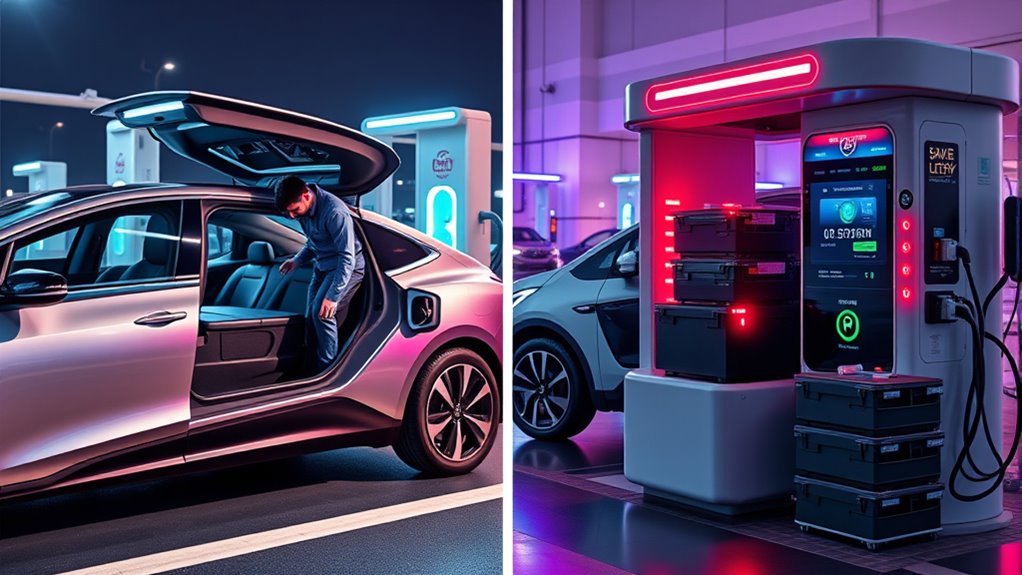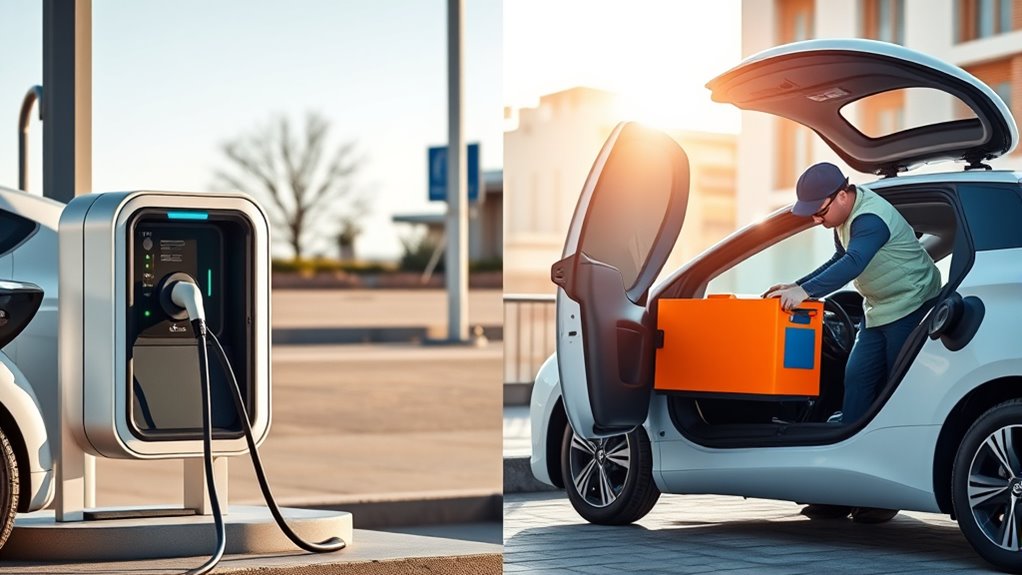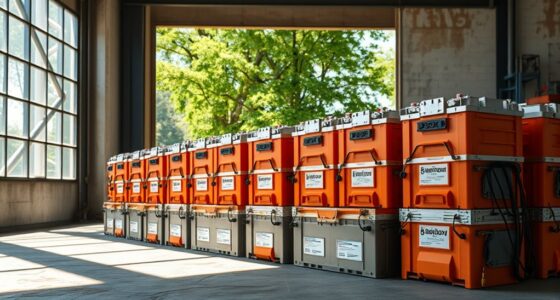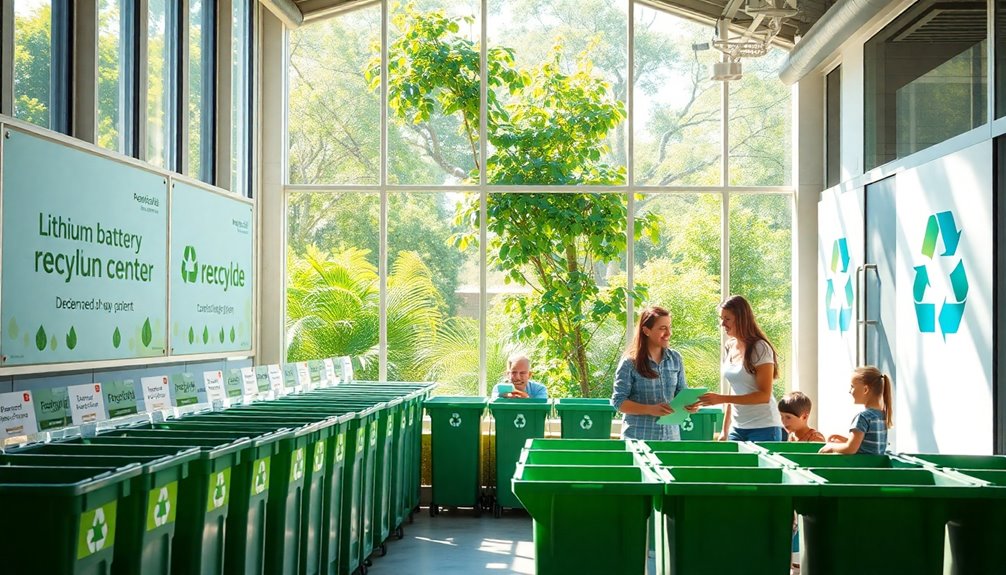When choosing a battery leasing service, you’ll find fixed models offer predictable monthly costs and warranty coverage, making them ideal if you value stability and manufacturer support. Swappable models focus on quick battery exchanges, reducing downtime for short trips or flexible schedules, but may have variable expenses. Both options aim to lower ownership costs and maintenance concerns. To discover which model suits your needs best and explore providers, keep exploring further.
Key Takeaways
- Fixed leasing offers predictable monthly costs with comprehensive manufacturer warranties, suitable for long-term, stable vehicle use.
- Swappable models enable quick battery exchanges, reducing downtime and ideal for short trips or flexible driving schedules.
- Fixed models typically include warranty coverage for battery issues, while swappable systems focus on station and battery performance during exchanges.
- Cost structures differ: fixed leases have consistent payments, whereas swappable models may have variable costs based on swap frequency.
- User preferences and driving habits determine the most suitable model—long-term stability favors fixed leasing, while flexibility favors swapping.

Battery leasing service providers are transforming how consumers access and use electric vehicle batteries. Instead of purchasing batteries outright, you can lease them, which often lowers the initial investment and offers flexibility. When considering leasing options, understanding the differences between fixed and swappable models is vital, especially in terms of battery warranty and leasing costs.
In fixed battery leasing models, you lease the battery along with the vehicle, and it’s usually integrated into the purchase price or offered as an add-on. With this setup, you’re protected by a battery warranty that typically covers issues like capacity loss or defects for a set period or mileage. This warranty provides peace of mind, guaranteeing that if the battery performance drops below a certain threshold, you won’t bear the repair or replacement costs. Leasing costs in fixed models are generally predictable because you pay a monthly fee, which can vary depending on the battery size and the leasing provider’s terms. Over time, this model offers stability, as your costs remain consistent, and you benefit from manufacturer support for battery maintenance and repair.
Swappable battery models take a different approach. Instead of owning or leasing a fixed battery, you exchange depleted batteries for fully charged ones at designated stations. This method appeals to those who prioritize minimizing downtime and maximizing driving range. Since you’re not directly responsible for the battery’s long-term health, the leasing costs are often lower upfront, and you can avoid concerns about battery degradation. However, the battery warranty in swappable systems generally covers the batteries’ performance during the exchange period, but it might be less detailed than fixed models. The focus here is on the quality and reliability of the swapping stations and batteries, which ensures consistent performance during each exchange. You pay for each swap, so your costs depend on how frequently you need to replace batteries. This can be advantageous if you make short trips or if the leasing provider offers flexible plans, but it can also lead to higher costs if you drive extensively. Additionally, advances in essential oils for battery maintenance are being explored to enhance battery longevity and performance.
Ultimately, both models aim to make electric vehicle ownership more affordable and convenient. Fixed leasing offers stability and extensive warranty coverage, providing predictable costs and peace of mind. Swappable models, on the other hand, focus on quick, convenient exchanges that reduce downtime, often at a lower initial cost but potentially higher ongoing expenses. Your choice depends on your driving habits, budget, and preference for either predictable monthly payments or flexible, on-demand battery access.
Frequently Asked Questions
How Do Leasing Costs Vary Between Fixed and Swappable Battery Models?
You’ll find that leasing costs differ markedly between fixed and swappable battery models. Fixed models usually have lower initial costs but may lead to higher long-term expenses due to maintenance and replacement. Swappable models often come with higher upfront pricing but benefit from flexible, lower-cost replacements. Your pricing strategies should consider these factors, balancing upfront costs against ongoing expenses to choose the most cost-effective option for your needs.
What Are the Safety Considerations for Swappable Batteries?
Think of swappable batteries as a double-edged sword—you must handle them with care. Safety considerations include proper battery maintenance to prevent leaks or fires, and thorough user training to avoid mishandling during swaps. Always check for damage before replacing, keep batteries away from extreme temperatures, and use designated tools. Staying vigilant guarantees safety, preventing accidents, and keeping your operations running smoothly. Remember, a little caution goes a long way.
How Do Service Providers Handle Battery Warranties and Replacements?
You should check if your service provider offers clear warranty policies that cover battery failures and replacements. They typically handle warranty claims by verifying battery certification to guarantee safety standards are met. When a battery needs replacing, providers often swap it out quickly, either through fixed or swappable models, ensuring minimal downtime. Always read the warranty terms carefully to understand coverage details and the process for obtaining certified replacement batteries.
What Is the Environmental Impact of Each Leasing Model?
You might think swappable batteries are eco-friendly, but the reality is tricky. Recycling challenges and resource depletion loom large, especially with fixed models that create more waste when batteries reach end-of-life. Swappable systems reduce waste through reuse, yet demand more resources for manufacturing. Ironically, both models strain the environment, highlighting that even with good intentions, we face tough choices balancing sustainability and resource conservation in battery leasing.
How Do Leasing Agreements Differ Across Regions or Countries?
You’ll find leasing agreements vary widely across regions due to regional regulatory differences and cultural acceptance. In some countries, strict regulations encourage standardized contracts and environmental commitments, while others prioritize flexibility. Cultural attitudes toward ownership also influence lease terms, with some areas favoring long-term commitments and others preferring short-term options. Understanding these regional nuances helps you navigate leasing agreements more effectively, ensuring compliance and aligning with local preferences.
Conclusion
Choosing between fixed and swappable battery leasing models depends on your needs, but did you know that the global electric vehicle battery swapping market is expected to grow at a CAGR of over 40% through 2027? This rapid expansion shows how innovative leasing options are revolutionizing mobility. By understanding these models, you can make smarter decisions that save money and reduce downtime. Embrace the future of energy solutions—your ride, your way!









